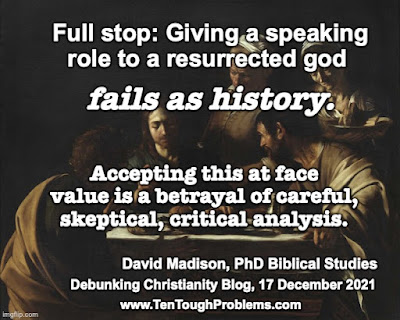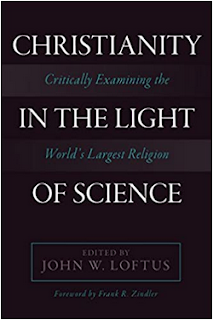I'm still working through Mark Mittelberg's apologetical book. It's a good one, better than most in that it's a unique, easily accessible one for popular readers, and better than Lee Strobel's type of books. Click on Mark's name below to see where we've been so far. Now on with the show for his chapter 11, where he shares 7 more arrows that point to the Bible as true. No, I'm not going to be comprehensive in responding here.
We're
celebrating the 12 days of Solstice rather than the 12 days of
Christmas. I'm done writing and editing books. So I'm highlighting each
of my twelve books leading up to the 25th of the month when we party. I'll tell
you something about each of them you probably don't know. [See Tag Below]
The first thing you should know is that the publisher wanted to name this
book, Deliver Us From Evil. Since my goal was to produce books named
after the
Four Horsemen
(plus Victor Stenger, who just missed that party with his 2007 NY Times
Bestseller, God: The Failed Hypothesis), I was adamantly opposed to it. So was Richard Carrier, and I think
Russell Blackford, who all voiced our objections.
On hindsight, after
I failed to edit a book named after Daniel Dennett's book, like Breaking the Christian Spell,
I wish we had used that provocative title instead. It sounds sexy doesn't it? Deliver Us From Evil. I like it now, especially after the rise to
power of Christian Theocratic/Nationalists with the twice impeached one-term former
President Donald Trump, and the January 6th failed coup attempt on American
democracy after failing to steal a presidential election.
The ongoing damage caused by religion

Here’s a rant against Jews that should horrify all Christians:
“… set fire to their synagogues or schools…bury and cover with dirt whatever will not burn, so that no man will ever again see a stone or cinder of them…I advise that their houses also be razed and destroyed. For they pursue in them the same aims as in their synagogues… I advise that all their prayer books and Talmudic writings, in which such idolatry, lies, cursing and blasphemy are taught, be taken from them…I advise that their rabbis be forbidden to teach henceforth on pain of loss of life and limb…I advise that safe-conduct on the highways be abolished completely for the Jews. For they have no business in the countryside, since they are not lords, officials, tradesmen, or the like…I advise that usury be prohibited to them, and that all cash and treasure of silver and gold be taken from them and put aside for safekeeping…I commend putting a flail, an ax, a hoe, a spade, a distaff, or a spindle into the hands of young, strong Jews and Jewesses and letting them earn their bread in the sweat of their brow…”















